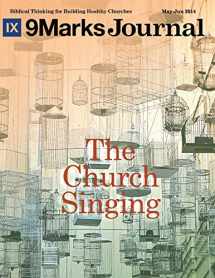
The Church Singing | 9Marks Journal (9Marks Journal May-June 2014)
Book details
Summary
Description
Singing is not one of the nine marks, a point which, not surprisingly, has come up once or twice with my minister-of-music father. That said, okay, yes, 9Marks does have a few opinions on music. Our understanding of the local church pushes us toward a slightly different perspective on church singing than some of our evangelical brothers and sisters. The difference comes down to the question of performance. Who is performing? The congregation or the people on stage? Dimming the lights and turning up the volume of instruments and leaders doesn’t necessarily mean you have turned the congregation into an audience, but it often does. Or think about it like this: is the “worship experience” in your church a solo transaction between the individual worshipper and God as stimulated by a high-emotion performer up front? Because here is an alternative: the musicians and song leaders help to facilitate an intellectually and emotionally engaged communal experience where members sing to one another while singing to God. The primary thing people hear is the faith-reinforcing praises and laments of their fellow saints. “I’m not the only one who rejoices like this…mourns like this…pleads like this. So does everyone around me!” They don’t listen for the organ, electric guitar, or praise ensemble. They listen for the folksy and hearty voices of other pilgrims walking alongside them on this long and rocky road of Christian obedience, rehearsing old memories of Calvary and new hopes of the heavenly city. Are these just my preferences that I’m trying to impose? I hope not. Think about what the New Testament emphasizes when it comes to the church’s corporate music. It doesn’t talk about crafting a highly charged worship “experience.” Interestingly, it doesn’t use the language of “worship” at all in this context (which is not to deny that corporate singing is worship). Instead, the Bible talks about the congregation singing to one another (Col. 3:16; Eph. 5:19), and doing everything for the sake of edifying one another (1 Cor. 14). That’s it: people singing together. When it comes to the topic of music, Christians might do well to talk about the church singing or the congregation singing because that’s what the Bible talks about. In this edition of the 9Marks Journal, we start with singing and the song. Why do congregations sing, what should they sing about, and how can they sing better? We then think more carefully about the music itself, particularly with two different perspectives on whether or not some musical forms are better than others. Finally we think about what is involved in leading music.


We would LOVE it if you could help us and other readers by reviewing the book
Book review



